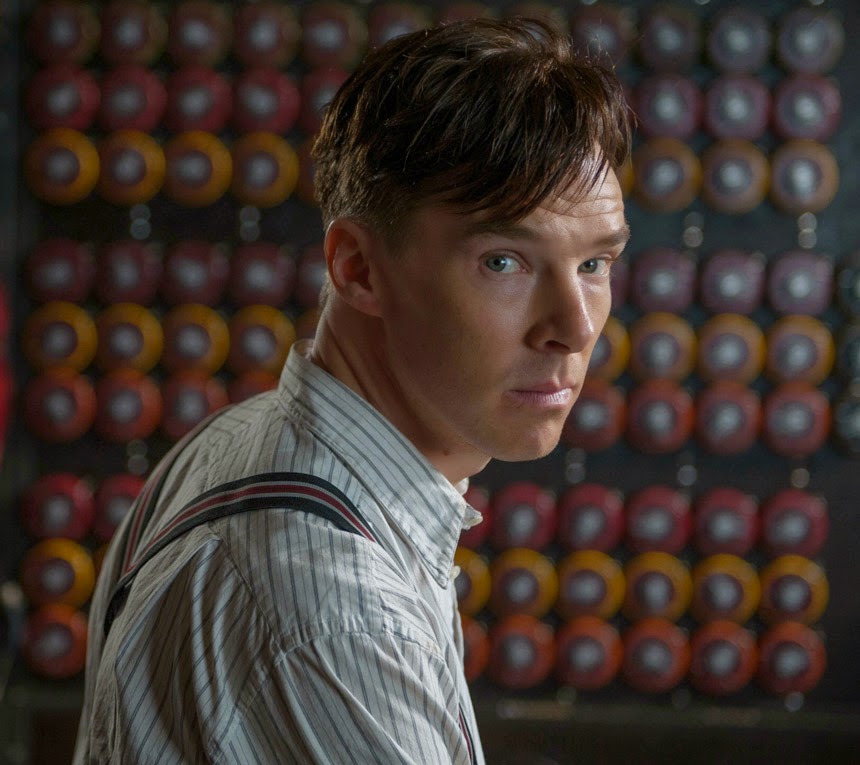Thursday, January 8, 2015
Review of The Imitation Game: Solving the Ultimate Puzzle
Usually movies about World War II involve soldiers facing insurmountable odds to defeat the enemy. Unbroken looked at Louis Zampirini and his struggles against a sadistic guard at a Japanese POW camp, and how his training as an athlete helped him survive. Brad Pitt's movie, Fury, looked at a tank crew behind enemy lines trying to get deep into Germany.
In The Imitation Game, there's also a struggle, but an internal one suffered by mathematical genius Alan Turing. He not only has to solve the Germans' unbreakable code known as Enigma, he also has to hide the fact that he is a homosexual, which, to people back then, was the more serious crime. Benedict Cumberbatch is just incredible as a man who starts as an insufferable genius and ends as someone who is tormented by that genius and the secrets he's had to hide.
His story takes three roads. The first road starts in 1951, when Turing's flat in Manchester is robbed, yet nothing is missing. That has the attention of a local cop (Rory Kinnear), who wonders if Turing may be hiding something.
Actually, he is: the fact that he broke a code and helped the Allies win the war. The second road for Turing starts in 1939, just as the war starts. He's recruited by Commander Kennison (Charles Dance), who doesn't like Turing's tone. When Turing mention Enigma, Kennison gives him a chance. He's also gotten the attention of Menzies (Mark Strong), who is with MI-6. The scene shifts to Bletchley, where Turing and other cryptographers try to break the code. He rubs the others the wrong way, especially when he thinks he can invent a machine that can solve Enigma. He gets some help from Joan Clarke (Keira Knightly), who's also good at mathematics. While the Enigma team treat Joan like an equal, she's still worried about what her parents will think. As the effort continues, she's determined to stay.
The third road the movie takes is his time in school at 16. He befriends a fellow student named Christopher, but the movie doesn't hint on whether they were intimate. He was still very special to Alan, which is why he named his machine Christopher.
Once the military decides to shut Turing down, This is where his arrogance turns into desperation. He insists his machine can work, and unlikely support from his crew gives him more time. However, he's also accused of being a Soviet spy, which has upset a movie reviewer because that never happened. However, his secret that he was gay is exploited by one of the crew who is a spy.
Another thing that's surprising about this movie is the moment when the crew does break Enigma. That means Germany is doomed, right? Well, Turing figures out that isn't quite true, and that their discovery has to be secret..or at least kept from the Germans.
Back in 1951, the officer finds out Turing is homosexual, although he suspected Turing of something worse. Here, they talk about the "imitation game", whether machines can think just like people. Actually, the movie shows he has been playing a different "imitation game" by hiding his homosexuality as well as making a machine that, in many ways, has changed the world.
This movie, though, gives a very real look at World War II where minds are the only weapons used. This should should be a strong contender during the awards season, especially Cumberbatch and Knightly. It may also wind up in Adapted Screenplay, but that will be more competitive than Best Picture. Still, it's been a great time for WW2 movies, and The Imitation Game shows that trying to beat the Axis powers through minds and codebreaking can be just as devestating as being on the battlefield.
Subscribe to:
Post Comments (Atom)


No comments:
Post a Comment